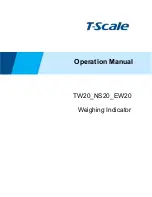
Section 4
Installation
Environmental Considerations
30
Thermo Scientific Orion
2230XP Silica Analyzer
VIEW DATA AND ALARMS
REVIEW/RESET ALARMS
Or a by running a manual calibration.
Placing the Analyzer into Service
Your analyzer is now ready for routine operation. To place the analyzer into routine service,
press the control panel RUN key.
The analyzer typically runs unattended, analyzing sample streams and calibrating itself at
regular intervals. All relevant parameters were programmed at the factory based upon your
application. Consequently, the analyzer is fully prepared for routine operation once you
complete these startup procedures.
A qualified and authorized user can change many of the operating parameters through the
password-protected “Technician Level” menu as detailed in the USER INTERFACE menu.
Validating a Calibration Standard
You can check the analyzer’s calibration accuracy at any time using the validation function.
Validation consists of running a single measurement cycle and reporting the result in
concentration. This reported result can then be compared to the expected value, which is the
known concentration of the validation solution, to determine the accuracy of system calibration.
The advantage of using this function over the Run Analysis function is that prior knowledge of
the concentration allows for validating the accuracy of the analyzer, without affecting the data
reporting to your control center or device.
NOTES:
Running a validation is identical to running an analysis:
although the
results are printed they are not stored, alarm conditions are not tested, and
the analog outputs are not updated.
It is highly recommended to allow the 2230XP Silica Analyzer to complete
its measurement cycle rather than using the STOP key. If the STOP key is
pressed before a measurement cycle is complete, it is highly recommended
to perform both the AUTO PRIME ALL and CLEAN sequences described in
Section 4.
















































